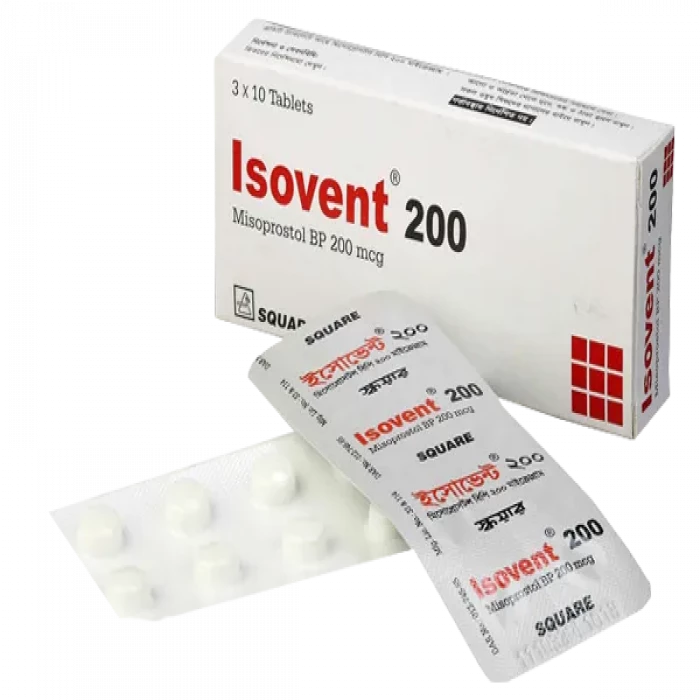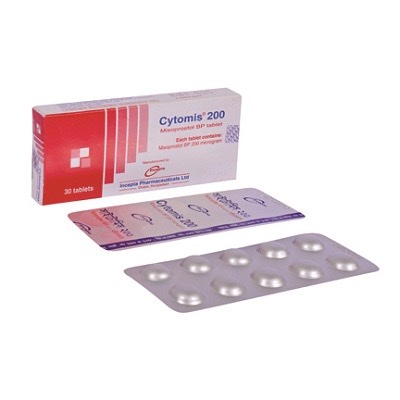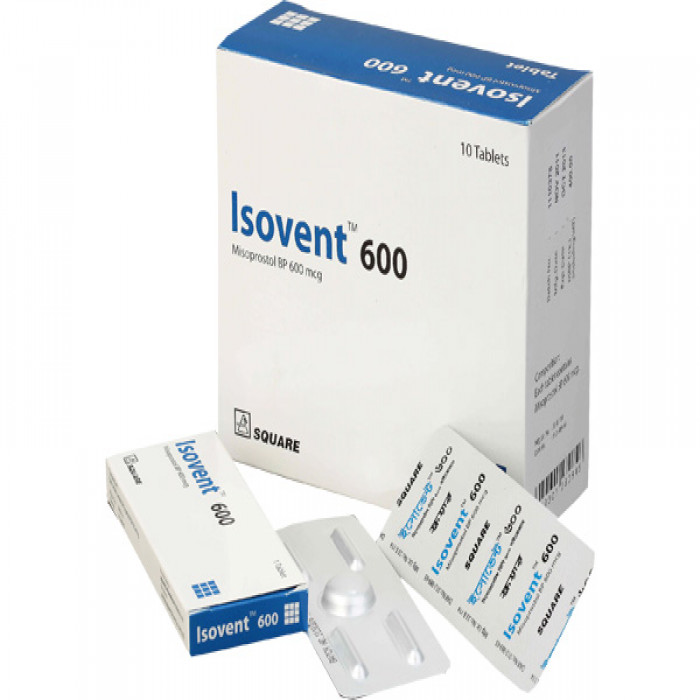
✔ 100% Authentic Product
👁️ Currently Viewing 18623
Isovent 200mcg Tablet
Isovent 200mcg (Misoprostol) Tablet is used for medical abortion and to treat post-delivery bleeding. It is used also for preventing stomach ulcers while you are under the medication of certain NSAID drugs; especially if you are at a greater risk or have a family medical history of ulcers. It can also help to decrease your risk of ulcer complications such as bleeding.
Discount
Price: ৳ 145
MRP:
৳
151
4%
Off

100% Genuine Products, Guaranteed

Safe & Secure Payments, Always

Fast, Secure & Efficient Delivery

Proper Packaging
 Cash on Delivery - All over Bangladesh
Cash on Delivery - All over Bangladesh Regular Delivery - 12-24 Hours, Dhaka City* Charge Tk.39-59
Regular Delivery - 12-24 Hours, Dhaka City* Charge Tk.39-59 Regular Delivery - 24-48 Hours, Other Cities* Charge Tk.99-110
Regular Delivery - 24-48 Hours, Other Cities* Charge Tk.99-110
🌙 রমযান অফার 🌙
 ফ্রি ডেলিভারিঃ - ৭৯৯ টাকা+ অর্ডারে, ঢাকা
শহরে
ফ্রি ডেলিভারিঃ - ৭৯৯ টাকা+ অর্ডারে, ঢাকা
শহরে ফ্রি ডেলিভারিঃ - ২৭৯৯ টাকা+ অর্ডারে, ঢাকার
বাহিরে
ফ্রি ডেলিভারিঃ - ২৭৯৯ টাকা+ অর্ডারে, ঢাকার
বাহিরে
📲 মোবাইল অ্যাপ অর্ডারে সাশ্রয় বেশী
-
Google Play Store থেকে ডাউনলোড
-
Apple Store থেকে ডাউনলোড
100% Genuine Products, Guaranteed
Safe & Secure Payments, Always
Fast, Secure & Efficient Delivery
Proper Packaging
 Cash on Delivery - All over Bangladesh
Cash on Delivery - All over Bangladesh Regular Delivery - 12-24 Hours, Dhaka City* Charge Tk.39-59
Regular Delivery - 12-24 Hours, Dhaka City* Charge Tk.39-59 Regular Delivery - 24-48 Hours, Other Cities* Charge Tk.99-110
Regular Delivery - 24-48 Hours, Other Cities* Charge Tk.99-110 ফ্রি ডেলিভারিঃ - ৭৯৯ টাকা+ অর্ডারে, ঢাকা
শহরে
ফ্রি ডেলিভারিঃ - ৭৯৯ টাকা+ অর্ডারে, ঢাকা
শহরে ফ্রি ডেলিভারিঃ - ২৭৯৯ টাকা+ অর্ডারে, ঢাকার
বাহিরে
ফ্রি ডেলিভারিঃ - ২৭৯৯ টাকা+ অর্ডারে, ঢাকার
বাহিরে- Google Play Store থেকে ডাউনলোড
- Apple Store থেকে ডাউনলোড
🌙 রমযান অফার 🌙
📲 মোবাইল অ্যাপ অর্ডারে সাশ্রয় বেশী
✅ Description:
- Isovent 200mcg Tablet is used for medical abortion, which is the termination of pregnancy using medication. It is most effective when used within the first 70 days of pregnancy. It works by increasing uterine contractions and dilating the cervix, leading to the expulsion of the pregnancy.
- The medication can also be used to prevent post-delivery bleeding that occurs due to poor uterine contraction after childbirth.
- Additionally, Isovent 200mcg Tablet is used to treat gastric ulcers, which are open sores in the stomach lining caused by acidic digestive juices.
- It's important to take Isovent 200mcg Tablet as prescribed by your doctor and for the recommended duration based on your medical condition.
- Possible side effects of Isovent 200mcg Tablet include heavy menstrual bleeding (menorrhagia), nausea, vomiting, diarrhea, uterine contractions, and stomach cramps. These side effects usually resolve over time and do not require medical attention. However, if they persist, it is advisable to consult your doctor.
- Do not stop taking Isovent 200mcg Tablet abruptly without consulting your doctor, as it may lead to an incomplete abortion or other complications.
- Inform your doctor before starting Isovent 200mcg Tablet if you have had an allergy to the medication in the past. Also, let your doctor know if you have taken oxytocin or if you are pregnant, trying to become pregnant, or breastfeeding, as Isovent 200mcg Tablet may have implications for these conditions.
Safety Advices

Alcohol
UNSAFE
Alcohol is known to cause excessive dizziness and if taken along with Isovent 200mcg Tablet and increase uterine bleeding.

Pregnancy
UNSAFE
It is exceedingly risky to use Misoprost tablet while pregnant. Research on pregnant women and animals has revealed severe risks to the growing infant. In case you are pregnant and have already taken this tablet, seek medical advice immediately.

Breastfeeding
UNSAFE
Isovent 200mcg Tablet is not recommended for use in breastfeeding women. Therefore, consult your doctor before taking it.

Driving
CAUTION
Do not drive or operate any heavy tools or machines if your ability is affected by Isovent 200mcg Tablet.

Kidney
CONSULT YOUR DOCTOR
Isovent 200mcg Tablet to be taken with caution, especially if you have a history of Kidney diseases/conditions. The dose may have to be adjusted by your doctor.

Liver
CONSULT YOUR DOCTOR
Isovent 200mcg Tablet to be taken with caution, especially if you have a history of Liver diseases/conditions. The dose may have to be adjusted by your doctor.
✔️ Uses of Isovent 200mcg Tablet
- Termination of Pregnancy
- Duodenal Ulcer
- Gastric Ulcer
- Nsaid Induced Ulcers
- Induction of Labor
- Postpartum Bleeding
- Cervical Ripening
✔️ How does Isovent 200mcg Tablet work?
Isovent 200mcg Tablet can help reduce the production of excessive stomach acid that may occur due to prolonged use of NSAIDs. By doing so, it aids in the healing of existing ulcers, prevents the formation of new ulcers, and provides relief from symptoms like acidity and heartburn that affect the gastrointestinal tract.
In addition, this medication also has effects on the uterine muscles. It stimulates their contractions, which can be useful in initiating labor pain, reducing postpartum bleeding, and inducing abortion in the early stages of pregnancy. Furthermore, it contributes to the softening and preparation of the cervix by breaking down cells and tissues surrounding it, particularly in advance of uterine procedures.
✔️ Side Effects of Isovent 200mcg Tablet
- Diarrhea
- Stomach Pain
- Pelvic Pain And Cramping
- Vaginal Bleeding
- Disrupted Menstrual Cycle
- Headache
- Vaginal bleeding
- Pelvic pain and cramping
- Shortness of breath
- Allergic skin reaction
- Swelling of face, lips, eyelids, tongue, hands and feet
- Disrupted menstrual cycle
- Constipation
- Flatulence
- Nausea Or Vomiting
✔️ Quick Suggestions:
- Isovent 200mcg Tablet is used in combination with another medication called mifepristone to terminate a pregnancy. It should be taken no later than 63 days after the first day of your last menstrual period. Take it 36-48 hours after taking mifepristone and rest for at least 3 hours after taking the medicine.
- If you vomit within 30 minutes of taking the tablet, contact your doctor immediately as you may need to take another tablet. It's important to take the medication only as prescribed by your doctor. Incomplete miscarriages can lead to serious medical complications, requiring hospitalization, and surgery, and potentially impacting fertility.
- After taking Misoprostol, you may experience vaginal bleeding lasting for approximately 12 days. If you have excessive bleeding or severe abdominal pain, inform your doctor immediately.
- Be cautious while driving or engaging in activities that require concentration, as the medication can cause dizziness and sleepiness. It's advisable to maintain a healthy weight within the body mass index (BMI) range of 19.5-24.9. Follow a diet rich in whole grains, fruits, vegetables, and low-fat dairy products. Avoid consuming foods or drinks that trigger acid reflux or heartburn, such as onions, peppermint, chocolate, caffeinated beverages, citrus fruits or juices, tomatoes, high-fat foods, and spicy foods.
- Quitting smoking and abstaining from alcohol can help lower the risk of complications. Avoid chronic stress and strenuous physical exercise like running, as it may increase vaginal bleeding. Monitor your blood pressure daily, and if you notice significant fluctuations, contact your doctor.
- To ensure the completion of the medical abortion without complications, it is recommended to undergo an ultrasound to confirm the termination of the pregnancy. Use contraception to avoid getting pregnant again.
✔️ Indication
Misoprostol-
- Treats and prevents peptic ulcer, predominantly caused due to excessive NSAID use (such as diclofenac, naproxen)
- Used for cervical ripening (prior to specific uterine procedures)
- Used for inducing labor pain
- Can induce abortion during the first trimester of pregnancy
- Prevents excessive blood loss after childbirth
✔️ Pharmacology
Misoprostol is well-absorbed by the body and undergoes rapid conversion to its active form, called Misoprostol acid, which is responsible for its clinical effects. Misoprostol acid can be detected in the bloodstream. When Misoprostol is taken with food, the maximum levels of Misoprostol acid in the blood are reduced. Additionally, the use of antacids along with Misoprostol can decrease the total availability of Misoprostol acid.
Misoprostol has two main properties: it inhibits gastric acid secretion, which helps reduce the production of stomach acid, and it has protective effects on the gastric mucosa (the lining of the stomach), as observed in animal studies. Nonsteroidal anti-inflammatory drugs (NSAIDs) can inhibit the production of prostaglandins, and a deficiency of prostaglandins in the gastric mucosa can lead to decreased secretion of bicarbonate (a substance that neutralizes stomach acid) and mucus. This deficiency may contribute to the damage that NSAIDs can cause to the gastric mucosa.
Misoprostol, on the other hand, can increase the production of bicarbonate and mucus in the stomach. However, it has been demonstrated in humans that this effect is seen at doses of 200 mcg and higher, which are also associated with the inhibition of gastric acid secretion. Therefore, it is not clear whether the ability of Misoprostol to reduce the risk of gastric ulcers is solely due to its antisecretory effect, its mucosal protective effect, or a combination of both.
In summary, Misoprostol has both antisecretory and mucosal protective properties. While it can increase bicarbonate and mucus production, its ability to reduce the risk of gastric ulcers may be attributed to its antisecretory effect, its mucosal protective effect, or a combination of both.
✔️ Dosage & Administration of Isovent 200mcg Tablet
Dosage and administration of Misoprostol for different indications:
Antiulcerant (reducing the risk of NSAID-induced gastric ulcers):
- Adult dose: 200 mcg four times daily with food. If 200 mcg cannot be tolerated, a dose of 100 mcg can be used. The medication should be taken for the duration of NSAID therapy as prescribed by the physician. The last dose of the day should be taken at bedtime.
- Renal impairment: Dose adjustment is not routinely needed in renal-impaired patients, but the dosage can be reduced if the 200 mcg dose is not tolerated.
Gynecological use (induction of labor):
- Vaginal administration: 25 mcg every 6 hours or, orally: 50 mcg every 4 hours. The medication should be taken with food.
- Oral dose: 100 mcg initially, followed by repeated doses of 100-200 mcg every 4 hours until labor is established (indicated by a Bishop score of 7 or more). Maximum number of doses is 6.
NSAID-induced ulcer treatment and prophylaxis:
- Adult dose: For benign gastric and duodenal ulceration and NSAID-associated ulceration, 800 mcg daily in 2-4 divided doses with meals and at bedtime. Treatment should continue for at least 4 weeks and can be extended up to 8 weeks if necessary. For prophylaxis of NSAID-induced gastric and duodenal ulcers, 200 mcg 2-4 times daily with NSAID. A dose of 100 mcg can be used if the higher dose is not tolerated. Misoprostol should be taken for the duration of NSAID therapy.
Termination of pregnancy:
- Day 1: 200 mg of mifepristone taken orally as a single dose under physician supervision.
- Days 2-3: 800 mcg of misoprostol taken buccally as a single dose, administered at least 24 hours, and a maximum of 48 hours after the mifepristone dose on day 1.
- Days 7-14: Follow-up visit to confirm complete termination. If complete expulsion has not occurred, another dose of 800 mcg misoprostol can be given buccally with a follow-up in approximately 7 days.
Postpartum Hemorrhage (PPH) prophylaxis:
- 400 mcg to 600 mcg orally or rectally immediately following delivery of the child.
Postpartum Hemorrhage (PPH) treatment:
- 1,000 mcg rectally or 200 mcg orally with 400 mcg sublingually.
Renal Dose:
- Use with caution in renal impairment, as there may be increases in peak plasma concentration, half-life, and bioavailability, although the clinical relevance of these increases is unclear.
✔️ Interaction
Isovent 200mcg Tablet has the following interactions with other medications and conditions:
Medicines for labor pain (Dinoprostone): There may be an increased risk of excessive uterine contractions and other adverse effects. It is important to avoid concomitant use or follow the specific instructions provided by your doctor.
Antacid (magaldrate): Concurrent use of antacids can reduce the effectiveness of the Isovent 200mcg Tablet. It is recommended to avoid taking antacids together with Isovent 200mcg Tablet or to separate their administration by a few hours.
Mineral supplements (magnesium carbonate, magnesium oxide) and medicines for constipation (magnesium hydroxide): These medications containing magnesium can enhance the gastrointestinal side effects of Isovent 200mcg Tablet, such as diarrhea. It is advisable to avoid or use them with caution, as directed by your doctor.
Blood pressure-lowering pills (quinapril): Concurrent use of quinapril and Isovent 200mcg Tablet may reduce the blood pressure-lowering effects of quinapril. Your doctor may need to adjust the dosage or monitor your blood pressure closely if you are taking these medications together.
Regarding drug-food interaction, it is recommended to avoid consuming grapefruit juice while taking Isovent 200mcg Tablet, as it may interfere with the metabolism and effectiveness of the medication.
Isovent 200mcg Tablet should not be given to patients with heart disease, as it can potentially worsen their condition. Additionally, caution should be exercised in patients with diarrhea, as Isovent 200mcg Tablet can increase the frequency and severity of diarrhea symptoms.
✔️ Contraindications
Misoprostol should not be taken by pregnant women to reduce the risk of ulcers induced by nonsteroidal anti-inflammatory drugs (NSAIDs) because it can cause miscarriage, premature birth, or birth defects. It is contraindicated in pregnancy.
Additionally, Misoprostol should not be taken by individuals with a history of allergy to prostaglandins, as it belongs to the prostaglandin class of medications. Allergic reactions to prostaglandins can be severe and potentially life-threatening.
It is important to follow the prescribing information and consult with a healthcare professional before starting any medication to ensure it is safe and appropriate for your specific circumstances.
✔️ Pregnancy & Lactation
Misoprostol, due to its abortifacient property, is contraindicated in pregnant women. However, in certain cases where women of childbearing potential require NSAID therapy and are at high risk of developing gastric or duodenal ulcers, Misoprostol may be prescribed after considering certain conditions:
- The patient had a negative serum pregnancy test within 2 weeks prior to starting the therapy.
- The patient is capable of complying with effective contraceptive measures.
- The patient has received both oral and written warnings about the risks associated with Misoprostol, including the risk of contraception failure, and the potential danger to other women if the drug is taken by mistake.
- The patient will begin taking Misoprostol only on the second or third day of the next normal menstrual period.
The excretion of the active metabolite, Misoprostol acid, into breast milk is possible but has not been extensively studied. Due to the potential for serious adverse reactions in nursing infants, Misoprostol is not recommended for use by nursing mothers.
It is important to consult with a healthcare professional for a thorough evaluation of individual circumstances and to discuss the potential risks and benefits before considering the use of Misoprostol in women of childbearing potential.
✔️ Precautions & Warnings
- It is important not to discontinue the use of Isovent 200mcg Tablet abruptly without consulting your doctor, especially if you are using it for pregnancy termination. Abruptly stopping the medication may result in an incomplete abortion.
- Before starting Isovent 200mcg Tablet, inform your doctor if you have ever had an allergy to Isovent 200mcg Tablet or any related medications.
- If you have previously taken oxytocin, it is important to inform your doctor before using Isovent 200mcg Tablet, as they may need to adjust the dosage or monitor your response to the medication.
- If you have heart disease, low or high blood pressure, or inflammatory bowel disease, it is crucial to discuss these conditions with your doctor before taking Isovent 200mcg Tablet. They can evaluate the potential risks and benefits of the medication in your specific situation.
- If you are pregnant or planning to become pregnant, it is important to inform your doctor before using Isovent 200mcg Tablet, as it may cause a miscarriage, premature birth, or birth defects.
- If you are breastfeeding, it is essential to immediately inform your doctor, as Isovent 200mcg Tablet can pass into breast milk and potentially cause diarrhea in your baby. Your doctor can provide guidance on the appropriate course of action in this situation.
✔️ Storage Conditions
Store in a cool and dry place, protected from light and moisture. Keep out of the reach of the children.
⚠️Disclaimer:
At ePharma, we’re committed to providing accurate and accessible health information. However, all content is intended for informational purposes only and should not replace medical advice from a qualified physician. Please consult your healthcare provider for personalized guidance. We aim to support, not substitute, the doctor-patient relationship.








